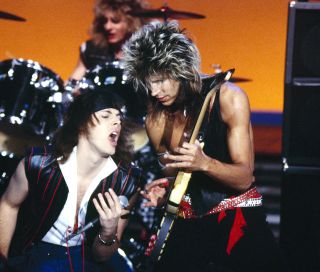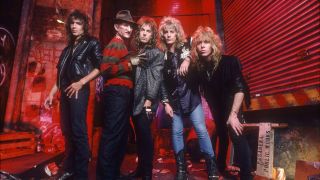They were in the back of a limo when it got ugly. It was March 1988, and LA rock band Dokken were in London, opening for AC/DC. Despite the success the band had, singer Don Dokken and guitarist George Lynch had never much liked each other. Don had come to regard George as “a miserable human being”; George considered Don a control freak with a “gigantic ego”. Finally, as the limo glided through the streets of west London towards the gig at Wembley Arena, Lynch snapped. “He jumped me,” Dokken recalls. “He got me in a headlock and started punching me. We just went at it.” The scuffle was halted by the band’s security man, but their blood was up. They couldn’t wait to get going again.
They were still trading threats as the limo pulled up backstage at Wembley. But as the doors swung open their tour manager was waiting. “Guys!” he said. “You’re on in ten minutes!” Don and George looked at each other, shrugged and walked in as if nothing had happened. They played the gig. For the time being, the fighting was over. The rivalry between an egotistical singer and a tortured-genius guitarist has been a feature of so many bands, from the Rolling Stones to Van Halen. But there was never more of an odd couple than Don Dokken and George Lynch. The amazing thing is that they put up with each other for long enough to make it big. As the old saying goes, there are three sides to every story: yours, mine and the truth. Never has it been more apt than with these guys. Dokken describes Lynch as “a conflicted soul – I don’t know if George is a genius or just crazy”. George says that Don was arrogant, aloof, and that his control of the band was “a power game”. Somewhere in all of this is a sense that they’re both right.

In 1977, Don Dokken and George Lynch were minor figures on the LA rock scene. Dokken had spent much of his formative years in foster homes. Lynch had a similarly turbulent upbringing. He began experimenting with alcohol and drugs at the age of 14, hopping freight trains and hanging out with hobos, before his parents took away his guitar and sent him to live with godparents in the mountains of Northern California.
By 1977, Dokken was fronting a group called Airborn, Lynch was guitarist in The Boyz. Dokken remembers seeing The Boyz play live. He liked their drummer, ‘Wild’ Mick Brown. He also liked the way Lynch played. But he’d heard the guitarist was a volatile character. Lynch’s first encounters with Dokken made him equally suspicious. “He seemed kind of weird,” he says. “A little sleazy.”
When Dokken heard of a similarly named group called Airborne, he decided to rename his own band. “I didn’t call the band Dokken out of ego,” he says. “But it sounded good – and it rhymed with rockin’.”
In 1980 they secured a deal with European label Carrere. The plan was to record an album in Germany with up-and-coming producer Michael Wagener, but they needed a drummer and a bassist. Don brought in bassist Juan Croucier. Then he called Mick Brown. And it was Brown who convinced Dokken to bring Lynch on board. “Honestly, I didn’t want George in the band,” Dokken says. “But Mick kept pushing me. And he was a great guitar player.”
Lynch and Brown had already moved on to another band, Xciter, and were paying the rent by delivering wine to liquor stores, but, according to Dokken, they agreed to make the record for $2,000 apiece. “It was the chance to do a record,” Lynch says, “so of course we’re gonna take that.”
Dokken recorded the album with Michael Wagener at Scorpions producer Dieter Dierks’s studio near Cologne. Lynch says that a hierarchy was in place from the very start: while making the album, he, Brown and Croucier were holed up in a crummy hotel, while Don was enjoying the hospitality of a German girlfriend at her plush, lakeside apartment. “Don took care of himself,” he says. Lynch also claims he never received his two thousand dollars. Unable to settle their hotel bill, they did a runner.
Breakin’ The Chains, was initially released in Germany in 1981 as a Don Dokken solo album, then reissued under the Dokken band name. The music was mostly generic heavy metal. It was not a great record, as the singer freely admits. “There were some vapid, bad attempts to write a hit song,” he says. “I tried and failed miserably.”
Back in LA, they went their separate ways. Croucier joined Ratt. Lynch and Brown went back to Xciter. Don Dokken hustled. “I knew a couple of A&R guys. I was begging them: please listen to our record. Every record company in town passed. For a year and a half, nothing happened.”
Lynch, too, feared that his big chance might never come. So when Don called in 1983 to ask him to rejoin Dokken, he didn’t hesitate. Sure, he didn’t trust the guy. But the singer had big news. He had signed to a major record company, Elektra, and was now being managed by Q Prime, whose clients included Def Leppard. Dokken were back in business and George Lynch wanted in.

In 1983, Breaking The Chains (the title slightly revised) was reissued on Elektra, but it would prove to be a false dawn. The album bombed, and Elektra considered dropping them.
What saved Dokken was the clout of Q Prime, the management company whose marquee band, Def Leppard, were breaking big with Pyromania. Q Prime persuaded Elektra CEO Bob Krasnow to back Dokken. The message was simple. “Just give them $100,000 and one more shot.”
Dokken survived to make a second album. Titled Tooth And Nail, and featuring new bassist Jeff Pilson, it sold half a million copies. “I’m a melodic singer,” says Dokken, “and Lynch was an aggressive, heavy guitarist. So we were one of the first bands that had heavy music but very melodic.”
They followed that in 1985 with the best album that Dokken would ever make: Under Lock And Key. The frontman wrote most of the material, but it was Lynch who wrote its opening track, Unchain The Night, one of the great rock songs of the 80s.
The album was another hit. But, as Lynch admits, with success came excess: “We were at the top of our game, and we were partying a lot.”
With this, Dokken became isolated within his own band. “Mick and George and Jeff had a bond,” he says, “and that was drugs. The three of them would get an ounce of coke and go off and do their thing. I’ve never done cocaine in my life.”
He wasn’t naïve. Cocaine was endemic in the music business of the 80s. There was no tension between him and Pilson and Brown. What he couldn’t stomach was Lynch’s attitude. “When I met George he had a station wagon and was sleeping in the back of it. He had nowhere to go but up. Even so, when we got famous and we had money, he still wasn’t happy. I don’t know why. I’m not a psychiatrist.”
In May 1988, just two months after George had jumped Don in the back of the limo in London, Dokken set out on the biggest tour of their career. Monsters Of Rock was a travelling festival playing 30 dates in stadiums across the US. Van Halen headlined. Below them, in descending order, were Scorpions, Dokken, Metallica and Kingdom Come.
At the end of 1987, Dokken had released their most successful album to date, Back For The Attack, which hit No.13 in the US. They’d also had an MTV hit with the song Dream Warriors, which was on the soundtrack to horror film A Nightmare On Elm Street 3 (the video features its star Robert ‘Freddy Krueger‘ Englund). But on this tour the band fell apart. At Monsters Of Rock, Dokken had to follow Metallica. Dokken didn’t stand a chance.
“Oh, man,” Dokken groans. “After Metallica went out and played Master Of Puppets, we sounded like the fucking Partridge Family.”
He asked Cliff Burnstein, co-manager of both bands, if the two bands could swap places. “I told him: ‘I know we’re making twice the money as Metallica, but can you please put ’em on after us, because they’re killing us?” Burnstein said no.
Dokken’s humiliation was complete following a show in New York. “There was this huge review in the New York Times,” Dokken recalls. “It said that Van Halen kicked ass, the Scorpions were super-amazing, Metallica are the new upstarts just breaking out in America, Kingdom Come was good… and there was just one line about us. It said: ‘During Dokken’s set a record number of hotdogs were sold.’ It was horrible.”
Dokken claims that the band’s performances at Monsters Of Rock were made weak by the other members’ drug use: “We just sucked. Those guys were sloppy, hungover.”
The pressure was getting to the singer. He was suffering anxiety attacks, and self-medicating with Valium and alcohol. Rightly or not, he blamed Lynch for the mess that the band was in. It was after the final show of the tour that Don called a meeting with the band, management and senior figures at Elektra. He delivered an ultimatum: “I said I couldn’t continue to play with Lynch. I told Jeff and Mick that we could continue, but that George and I had come to a crossroads. This is over.”
Lynch remembers it differently. He says that Don had planned to break up the band before Monsters Of Rock. He claims that Don had told them: “I’m not gonna tour with you guys after this. If you’re not gonna give me the name, I’m gonna sue you. And maybe you guys could work for me – I could hire you.” Lynch says that this left him feeling “completely demoralised” on the Monsters Of Rock tour.
Following the meeting, Elektra made a play to keep their money-spinning band together. “They offered ten million dollars to do two more albums,” Dokken says. “That’s a lot of frickin’ money.” Dokken’s decision was made for him, when Brown and Pilson said they were backing Lynch. “That’s when I left the band,” Dokken says. “It was almost impossible, since it was my band. And who wants to walk away from a lucrative career? But if I hadn’t I probably would have had a nervous breakdown.”
The animosity between them did not end with the split. When Don tried to form a new version of Dokken without Lynch, Brown and Pilson, they sued him and won. “Unfortunately,” the singer says, “I did send a paper saying: ‘If you’re gonna stay with George, I’m out.’ The judge ruled in their favour, and I wasn’t allowed to use the name Dokken for five years. That hurt me.”
During the early 90s, Dokken pursued a solo career, and Lynch formed Lynch Mob with Brown. The prospect of a Dokken reunion seemed unlikely. But in 1994 it happened. Initially, Don refused to work with Lynch, but the record label wanted the classic line-up. John Kalodner, the heavyweight record industry veteran who brokered the deal, reassured Don that five years was a long time – people change. Eventually the singer swallowed his pride and called his old bête noire. “He’d mellowed out and wasn’t habouring any resentment,” says Lynch. “So I thought, okay.”
Their comeback album, the aptly named Dysfunctional, was a solid record and sold 400,000. But old enmities soon resurfaced. During a Japanese tour in 1995, Dokken and Lynch were barely on speaking terms. Don decided to confront the issue head-on.
“We were doing a soundcheck, and I asked George: ‘What is the problem?’ And he pointed up at the backdrop, and there’s my name up there. He goes: ‘That’s the problem.’ He believed that I was getting the kudos.”
They stuck around to make another album, 1997’s Shadowlife (“A piece of crap,” says Dokken), but they kept their distance on tour. The end of the line came with another physical altercation.
“George started acting up again,” Dokken says, “and one day he punched me. I said that’s it. I got my shit and went home.”
Lynch says he was back in Arizona when he received notice of his dismissal. It was a cold, one-sentence fax: ‘George, we’ve decided to fire you.’ It had Mick, Jeff and Don’s signatures.

Dokken – the man and the band – carried on without him. Since 1999 there have been five studio albums and numerous failed attempts at reuniting the classic line-up. “But in the end,” says Dokken, “I chose happiness over greed. Life is good. Why be miserable?” That decision was in part informed by being diagnosed with cancer in 2009. “Luckily,” he says, “the tumor was small and they got to it early. But when I beat cancer, my perceptions changed about life and how precious it is.”
Today, Lynch is blunt in his assessment of his former bandmate as both a singer and a person. “He was not the singer that we wanted him to be,” he says. “The singer that would have made the band as great as it could have been. He also had to be absolute alpha-male top dog.”
Don says has been unfairly maligned due to what Lynch has said about him in public. “I’ve had a million people say to me: ‘I expected you to be an asshole, a prima donna.’ That was my reputation, because George was putting it out there.”
Dokken is a classic Hollywood rock’n’roll story, without the Hollywood ending. Dokken and Lynch are smart guys, able to laugh at the absurdity of what they’ve been through together. But in the end there was just too much shit that went down between them; too much to let go of now.
What remains is a sense of pride in what they achieved. In a golden age for American rock, Dokken had a good run. Their best songs were a part of the soundtrack of that age. They sold millions of records and played on the biggest stages. They were famous despite themselves. “I’m proud of our success,” Dokken says. “It was fifty per cent luck – right time, right place. We weren’t The Beatles, but we had something. And we were a pretty big band. I’m grateful for that.”


